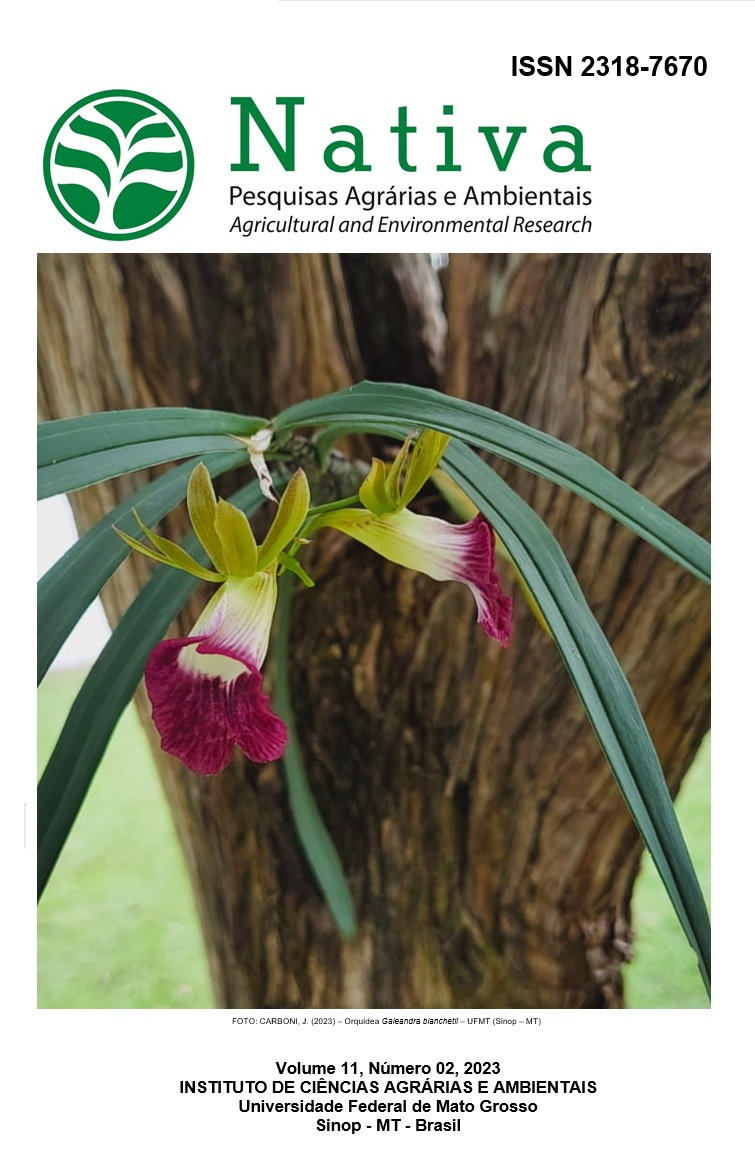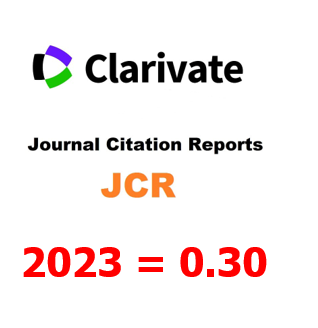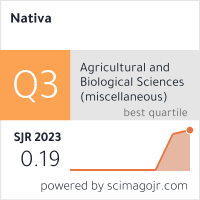POSSIBLE HUMAN HEALTH RISKS OF NITRATES IN DRINKING WATER: A CASE STUDY OF GROUNDWATER IN WANA DISTRICT, NORTHERN IRAQ
DOI:
https://doi.org/10.31413/nat.v11i2.15742Palavras-chave:
nitrate, NPI, HHRNO3Resumo
ABSTRACT: The purpose of this research is to determine how dangerous nitrates (HHRNO3) in the drinking water of the Wana district northeast of Mosul are to human health. Where 100 water samples were taken from 10 wells across the region, between July 2022 and January 2023, to determine the average nitrate ion concentration, the average chronic nitrate ion intake, and the risk quotient (QHI) for people of varying ages. According to the study's findings, nitrate concentrations ranged from (3.0 to 15) ppm at a rate that did not exceed (12.3 ± 0.05) ppm, which is within limits recommended by the World Health Organization, which was reflected in the NPI values to range between (-0.27 to 0.23) to classify the studied water is from the category of clean water to light polluted with nitrates. As for the effects of nitrates' chronic daily intake (CDI) and risk factor (QHI), they fluctuated between (0.081 to 0.876) mg kg-1 daily, and (0.548 to 0.050) successively, the highest values were in infants, followed by children aged (6 to 11) years, then elderly females, with values (0.554 and 0.474) mg kg-1 daily and (0.346 and 0.296), consecutively. While the age group (16 to 18) years was the least affected by the dangers of nitrates, the chronic daily intake values and the risk quotient ranged between (0.081 to 0.330) mg kg-1 daily, and (0.050 to 0.206). Thus, the studied water is considered safe for drinking because it is within the levels recommended by the US. Environmental Protection Agency (QHI=1.0).
Keywords: nitrate; NPI; HHRNO3.
Possíveis riscos à saúde humana por nitratos na água potável: um estudo de caso de água subterrânea no Distrito de Wana, Norte do Iraque
RESUMO: O objetivo desta pesquisa foi determinar a periculosidade para a sáude humana associado aos nitratos (HHRNO3) na água potável do distrito de Wana, a nordeste de Mosul. Foram coletadas 100 amostras de água, de 10 poços em toda a região, entre julho de 2022 e janeiro de 2023, para determinar a concentração média de íons de nitrato, a ingestão crônica média de íons de nitrato e o quociente de risco (QHI) para pessoas de várias idades. De acordo com os resultados do estudo, as concentrações de nitrato variaram de 3,0 a 15 ppm, a uma taxa que não ultrapassou 12,3±0,05 ppm, sendo considerado dentro dos limites recomendados pela Organização Mundial da Saúde. Isso refletiu nos valores do NPI entre -0,27 a 0,23, permitindo classificar a água estudada como da categoria de água limpa para poluição com nitratos. Quanto aos efeitos da ingestão diária crônica de nitratos (CDI) e fator de risco (QHI), esses indices oscilaram de 0,081 a 0,876 mg kg-1 diariamente, e de 0,548 a 0,050, respectivamente. Os maiores valores foram obtidos em lactentes, seguidos por crianças com idade de 6 a 11 anos (0,554 e 0,474 mg kg-1 diariamente) e idosos do sexo feminino (0,346 e 0,296) consecutivamente. Enquanto a faixa etária (16 a 18) anos foi a menos afetada pelos perigos dos nitratos. Os valores de ingestão diária crônica e o quociente de risco variaram de 0,081 a 0,330 mg kg-1 diariamente e de 0,050 a 0,206. Assim, a água estudada é considerada segura para consume, por estar dentro dos níveis recomendados pelos EUA, com QHI=1,0.
Palavras-chave: nitrato; NPI; HHRNO3.
Referências
ABBASNIA, A.; YOUSEFI, N.; MAHVI, A. H.; NABIZADEH, R.; RADFARD, M.; YOUSEFI, M.; ALIMOHAMMADI, M. Evaluation of groundwater quality using water quality index and its suitability for assessing water for drinking and irrigation purposes: Case study of Sistan and Baluchistan province (Iran). Human and Ecological Risk Assessment: An International Journal, v. 25, n.4, p. 988-1005, 2019. https://doi.org/10.1080/10807039.2018.1458596
ADIMALLA, N.; LI, P. Occurrence, health risks, and geochemical mechanisms of fluoride and nitrate in groundwater of the rock-dominant semi-arid region, Telangana State, India. Human and Ecological Risk Assessment: An International Journal, v. 25, n. 1-2, p. 81-103, 2019. https://doi.org/10.1080/10807039.2018.1480353
AHMED, G. A. H.; SANTURAKI, A. H.; MUKHTAR, M. Assessing the pollution indicator in groundwater in Hadejia metropolis, Jigawa state, Nigeria. International Journal of Chemistry Studies, v. 3, n. 2, p. 11-13, 2019.
AL-BHAR, B. M. A.; AL-SAFFAWI, A. Y. T. Health effect of nitrate concentration in the groundwater of Al-Manara village, north-east of Mosul city Iraq. Science Archives, v. 2, n. 3, p. 267-271. 2021. https://doi.org/10.13140/RG.2.2.16700.16005
AL-GADI, N. A. S.; AL-SAFFAWI, A. Y. T.; BÉJAOUI, M.; MAHMOUDI, E. Investigation of the potential risks to the human health risk of fluoride and nitrate via water consumption for some areas in Nineveh Governorate, Iraq. Acta Geophysica, p. 1-15, 2023. https://doi.org/10.1007/s116000-2201006-z
AL-HAMDANY, N. A. S.; AL-SHAKER, Y. M. S.; AL-SAFFAWI, A. Y. T. Application of nitrate pollution index (NPI) to evaluate the health safety of wells water for some quarters of the left side of Mosul city, Iraq. Biochemical and Cellular Archives, v. 20, n. 2, p. 6063-6068, 2020.
ALHARBI, T.; EL-SOROGY, A. S. Health Risk Assessment of Nitrate and Fluoride in the Groundwater of Central Saudi Arabia. Water, v. 15, n. 12, e2220, 2023. https://doi.org/10.3390/w15122220
AL-MASHHADANY, M. H. S. Valuation of groundwater contaminated with nitrates and human health risks (HHR) between villages of Sinjar and Tal Afar districts, Iraq. Pakistan Journal of Analytical & Environmental Chemistry, v. 23, n. 2, p. 277-287, 2022. http://doi.org/10.21743/pjaec/2022.12.10
AL-SAFFAWI, A. Y. T.; AWAD, M. H. Human health risk (HHR) of Nitrates in the groundwater of Abuwajnah village, Talafar district Iraq. World Journal of Pharmaceutical and Life Sciences, v. 6, n. 8, p. 13-19, 2020.
AL-SAWAF, F. D. Hydrogeology of South Sinjar Plain NW-Iraq. 211p. Doctoral Thesis – University of London, 1977. Available on: https://discovery.ucl.ac.uk/id/eprint/1349178/
AL-SINJARI, W. E.; AL-SAFFAWI, A. Y. T.; AL-TAEE, Y. A. J. Application of WQI Model to Assessment of water for irrigation and livestock drinking purpose: the case study, Groundwater quality of Gleewkhan village southeastern of Mosul city, Iraq. Journal of Engineering and Applied Sciences, v. 14, n. 9, p. 10706-10710, 2019.
ALYAN, Y. J. M. Subsurface geology of the Felville and wanh using geophysical data. 156p. Doctoral Thesis (unpublished) [Philosophy in Earth Sciences and Geophysics] - University of Mosul, College of Science, Mosul, 2010.
APHA_AWWA and WCPE. Standard method for examination of water and wastewater American public Health Association, 20th ed. Washington DC, USA. 1998.
APHA_AWWA and WCPE. Standard Method for Examination of water and wastewater American public Health Association, 23 ed; Washington DC, USA. 2017.
BREDA, S. G.; MATHIJS, K.; KISS, V.; KUHNLE, G. G.; VEER, B.; JONES, R. R.; SINHA, R.; WARD, M. H.; KOK, T. M. Impact of high drinking water nitrate levels on the endogenous formation of apparent N- nitroso compounds in combination with meat intake in healthy volunteers. Environmental Health, v. 18, p. 87-99, 2019. http://doi.org/10.1186/s12940-019-0525-z.
CHEN, F.; YAO, FL; MEI, G; SHANG, Y; XIONG, F; DING, Z. Groundwater quality and potential human health risk assessment for drinking and irrigation purposes: a case study in the Semiarid Region of North China. Water, v. 13, e783 2021. https://doi.org/10.3390/w13060783
COFFMAN, V. R.; JENSEN, A. S.; TRABJERG, B. B.; PEDERSEN, C. B.; HANSEN, B.; SIGSGAARD, T.; OLSEN, J.; SCHAUMBURG, I.; SCHULLEHNER, J.; PEDERSEN, M.; STAYNER, L. T. Prenatal exposure to nitrate from drinking water and markers of fetal growth restriction: A population-based study of nearly one million Danish-born children. Environmental Health Perspectives, v. 129, n. 2, e27002, 2021. https://doi.org/10. 1289/EHP73 31
DOUNA, B.K; YOUSEFI, H. Risk of nitrate residues in food products and drinking water. Asian Pacific Journal of Environment and Cancer, v. 6, n. 1, p. 69-79, 2023. https://doi.org/10.31557/APJEC.2023.6.1.69-79
GROUT, L.; CHAMBERS, T.; HALES, S.; PRICKETT, M.; BAKER, M. G.; WILSON, N. The potential human health hazard of nitrates in drinking water: a media discourse analysis in a high‑income country. Environmental Health, v. 22, e09, 2023. https://doi.org/10.1186/s12940-023-00960-5
JUNTAKUT, P.; HAACKER, E. M.; SNOW, D. D.; RAY, C. Risk and Cost Assessment of Nitrate Contamination in Domestic Wells. Water, v. 12, e428, 2020. https://doi.org/10.3390/w12020428
LI, D.; NISHI, S. K.; JOVANOVSKI, E.; ZURBAU, A.; KOMISHON, A.; MEJIA, S. B.; KHAN, T. A.; SIEVENPIPER, J. L.; MILICIC, D.; JENKINS, A.; VUKSAN, V. Repeated administration of inorganic nitrate on blood pressure and arterial stiffness: a systematic review and meta-analysis of randomized controlled trials. Journal of Hypertension, v. 38, n. p. 2122-2140, 2020. http://doi.org/10.1097/HJH.0000000000002524
LIN, L.; CLAIR, S.; GAMBLE, G. D.; CROWTHER, C. A.; DIXON, L.; BLOOMFIELD, F. H.; HARDING, J. E. Nitrate contamination in drinking water and adverse reproductive and birth outcomes: a systematic review and meta‑analysis. Scientific Reports, v. 13, e563. 2023. https://doi.org/10.1038/s41598-022-27345-x
MOTHFER, Z. A.; AL-SAFFAWI, A. Y. T. Probabilistic risk of nitrates to human health via drinking water: A case study of water supply for Dandan station and its quarters in Mosul city, Iraq. Journal of Advances in Environmental Health Research, 2023. https://doi.org/10.22102/JAEHR.2023.356398.1310
MUHIB, I.; ALI, M.; TAREQ, S. M.; RAHMAN, M. Nitrate Pollution in the Groundwater of Bangladesh: An Emerging Threat. Sustainability, v. 15, n. 10, e8188, 2023. https://doi.org/10.3390/su15108188
NUJIĆ, M.; HABUDA-STANIĆ, M. Nitrates and nitrites, metabolism and toxicity. Food in Health and Disease, v. 6, n. 2, p. 48-89. 2017.
PANNEERSELVAM, P.; KARUPPANNAN, S.; MUNIRAJ, K. Evaluation of drinking and irrigation suitability of groundwater with special emphasizing the health risk posed by nitrate contamination using nitrate pollution index (NPI) and human health risk assessment (HHRA). Human and Ecological Risk Assessment, v. 27, p. 1324-1348. 2020. https://doi.org/10.1080/10807039.2020.1833300
SHALYARI, N.; ALINEJAD, A.; HASHERNI, A. H.; RADFARD, M.; DEHGHANI, M. Health risk assessment of nitrate in groundwater resources of Iranshahr using Monte Carlo simulation and geographic information system (GIS). MethodsX, v. 6, p. 1812-1821, 2019.
SHERRIS, A. R.; BAIOCCHI, M.; FENDORF, S.; LUBY, S. P.; YANG, W.; SHAW, G. M. Nitrate in drinking water during pregnancy and spontaneous preterm birth: A retrospective within- other analysis in California. Environmental Health Perspectives, v. 129, n. 5, e57001, 2021. https://doi.org/10. 1289/EHP8205
STAYNER, L. T.; JENSEN, A. S.; SCHULLEHNER, J.; COFFMAN, V. R.; TRABJERG, B. B.; OLSEN, J.; HANSEN, B.; PEDERSEN, M.; PEDERSEN, C. B.; SIGSGAARD, T. Nitrate in drinking water and risk of birth defects: findings from a cohort study of over one million births in Denmark. The Lancet Regional Health – Europe, v. 14, e100286, 2022. https://doi.org/10.1016/j.lanepe.2021.100286
TEMKIN, A.; EVANS, S.; MANIDIS, T.; CAMPBELL, C.; NAIDENKO, O. V. Exposure-based assessment and economic valuation of adverse birth outcomes and cancer risk due to nitrate in United States drinking water. Environmental Research, v. 176, e108442, 2019. https://doi.org/10.1016/j.envres.2019.04.009
TOOLABI, A.; BONYADI, Z.; PAYDAR, M.; NAJAFPOOR, A. A.; RAMAVANDI, B. Spatial distribution, occurrence, and health risk assessment of nitrate, fluoride, and arsenic in Bam groundwater resource, Iran. Groundwater for Sustainable Development, v. 12, e100543, 2021. https://doi.org/10.1016/j.gsd.2020.100543
VERMEER, I. T. M.; PACHEN, F. D. M.; DALLINGA, J. W.; KLEINJANS, J. C. S.; MAANEN, M. S. Volatile N-Nitrosamine formation after intake of nitrate at the ADI Level in combination with an amine-rich diet. Environmental Health Perspectives, v. 106, n. 8, p. 459-463, 1998.
WHO_WORLD HEALTH ORGANIZATION. Guidelines for Drinking water Quality. 4th Edition. Switzerland: WHO, 2017. 631p.
YU, G.; WANG, J.; LIU, L.; LI, Y.; ZHANG, Y.; WANG, S. The analysis of groundwater nitrate pollution and health risk assessment in rural areas of Yantai, China. BMC Public Health, v. 20, p. 437-443, 2020. https://doi.org/10.1186/s12889-020-08583-y
ZHANGE, Q.; XU, P.; QIAM, H. Assessment of groundwater quality and Human Health risk (HHR), evaluation of nitrate in the central-western Guanhony basin. China. International Journal of Environmental Research and Public Health, v. 16, e4246, 2019. https://doi.org/10.3390/ijerph16214246
ZUCKERBRAUN, B. S.; GEORGE, P.; MARK, T.; GLADWIN, M. T. Nitrite in pulmonary arterial hypertension: therapeutic avenues in the setting of dysregulated arginine/nitric oxide synthase signalling. Cardiovascular Research, v. 89, n. 3, p. 542–552, 2017. https://doi.org/10.1093/cvr/cvq370
Downloads
Publicado
Versões
- 2024-06-11 (2)
- 2023-07-04 (1)
Edição
Seção
Como Citar
Licença
Copyright (c) 2023 Nativa

Este trabalho está licenciado sob uma licença Creative Commons Attribution-NonCommercial 4.0 International License.
Direitos Autorais para artigos publicados nesta revista são do autor, com direitos de primeira publicação para a revista. Em virtude de a aparecerem nesta revista de acesso público, os artigos são de uso gratuito, com atribuições próprias, em aplicações educacionais e não-comerciais.
A artigos publicados nessa revista, podem ser reproduzidos parcialmente ou utilizados como referência por outros autores, desde que seja cita a fonte, ou seja, a Revista Nativa.
Copyright for articles published in this journal are the authors, with first publication rights granted to the journal. The journal shows open access, and articles are free to use, with proper attribution, in educational and non-commercial.
The articles published in this journal may be reproduced in part or used as a reference by other authors, provided that the source is quoted.






